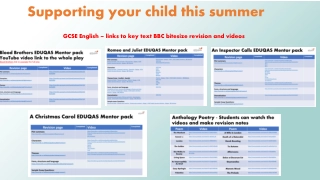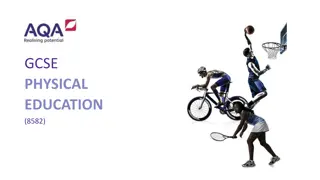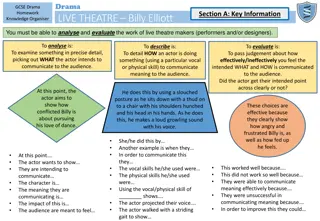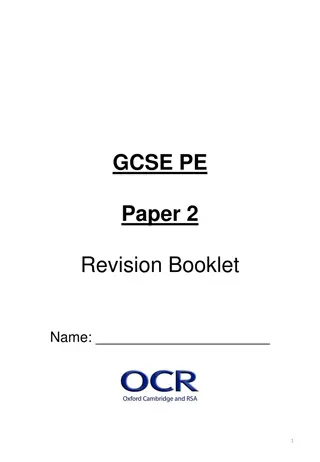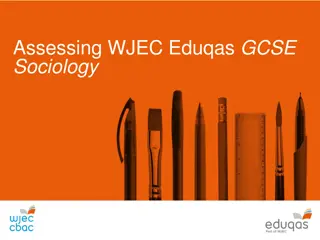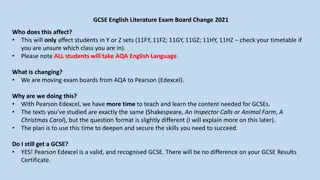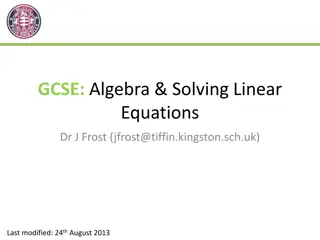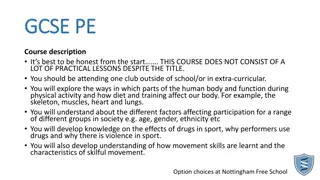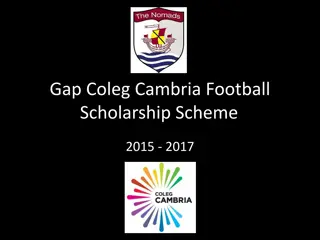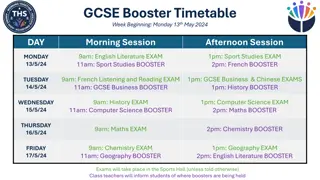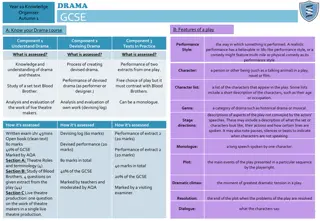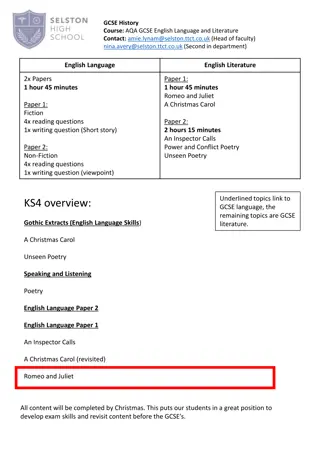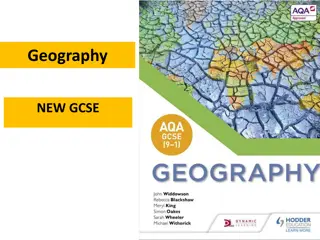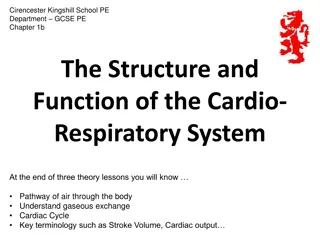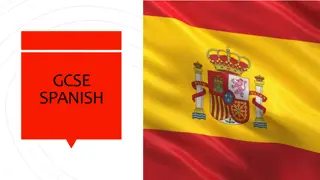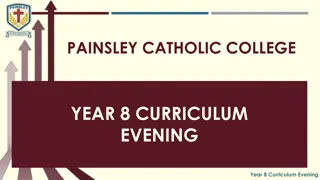GCSE Physical Education
GCSE Physical Education course covers body systems, health and fitness, practical activities, and personal exercise planning. Students will be assessed in individual and team sports, and the qualification is recognized for further study opportunities.
Download Presentation

Please find below an Image/Link to download the presentation.
The content on the website is provided AS IS for your information and personal use only. It may not be sold, licensed, or shared on other websites without obtaining consent from the author.If you encounter any issues during the download, it is possible that the publisher has removed the file from their server.
You are allowed to download the files provided on this website for personal or commercial use, subject to the condition that they are used lawfully. All files are the property of their respective owners.
The content on the website is provided AS IS for your information and personal use only. It may not be sold, licensed, or shared on other websites without obtaining consent from the author.
E N D
Presentation Transcript
GCSE Physical Education
GCSE Physical Education What will you study? You will learn Components 1 & 2 simultaneously over both year 10 & 11, and will start on your PEP towards the end of year 10, finishing it at the start of year 11. The GCSE is made up of 4 components: Component 1 Body Systems 36% Component 2 Health & Fitness 24% Your practical component is on-going throughout the two years. Component 3 Practical 30% Component 4 Personal Exercise Plan (PEP) 10%
What will you study? Component 1 Component 2 Body systems (bones, muscles, cardiorespiratory system) Fitness and training Drugs in sport Sports Injuries Health and Physical Activity Participation in Sport Commercialisation and Media Sports Psychology Component 4 - Personal Exercise Plan Fitness testing Plan and complete a 6 week plan Review how effective the plan was Component 3 Practical One team activity One individual activity One team or individual See a full list of activities on the back of the information sheet
What sports can you be assessed in? Individual Sports Amateur Boxing Athletics one event in track or field Badminton (singles) Cycling (road or track) Dance* Diving Gymnastics* Equestrian (show jumping, cross country or dressage) Rock climbing Rowing Skiing Snowboarding Squash Swimming (not synchronised swimming) Table Tennis (singles) Tennis (singles) Trampolining Team Sports Football Badminton (doubles) Basketball Cricket Dance* Gaelic Football Handball Hurling Lacrosse Netball Rowing Rugby League Rugby Union Squash Table Tennis (doubles) Tennis (doubles) Volleyball
OCR Cambridge Nationals in Sports Studies
OCR Cambridge Nationals in Sport Studies Course overview The course provides an engaging and relevant introduction to the world of sport. The OCR Cambridge National in Sports Studies is a full-time study programme that is aimed at students wanting to develop applied knowledge and practical skills in Sport Studies. Some key topics covered: Organising, planning, and evaluating sports activity sessions for primary school children Demonstrating the key components of performance practically in two selected sports Building understanding of topical and contemporary issues in sport such as issues that affect participation in sport Positive and negative impacts of the media in sport
OCR Sports Studies How is this course recognised alongside traditional GSCE topics? The course is worth the equivalent of 1 GCSE and is recognised in the performance tables to allow students to use this qualification to progress onto further study. How the course is graded: Pass Level 4 Merit Level 6 Distinction Level 8 Distinction Level 8.5 The qualification is just as recognised as GCSE S.
OCR Sports Studies How will this help students in the future? If students are interested in taking their study of sport further, the subject-specific knowledge and skills developed through studying this qualification will give them a strong foundation for academic or vocational study at level 3. The course could lead to: - Edexcel BTEC Level 3 in Sport - Advanced Level Physical Education - Cambridge Technicals Level 3 - Direct entry into the sport industry
OCR Sports Studies How is the work assessed? Most progress is measured throughout the course with 60% of the course being assessed via coursework The course include two mandatory units and one optional unit: - Mandatory Unit Performance and Leadership in Sport worth 40% - this includes developing and performing in two activities and leading one activity to students in KS2/KS3 - Mandatory Unit - External exam worth 40% at the end of year 11 - Optional unit: Awareness of outdoor and adventurous activities OR Sport and the Media (20% of grade) and coursework based.
OCR Sports Studies Will all my study be at school? How will it link to learning in KS3? Will all my study be in school? The course will be school-based with the opportunity for various sport-related visits throughout the two years. You will also have numerous assignment-based home learning tasks. How will it be similar to what I have done in Year 9? In the practical side of this course, you will continue to develop your technical and tactical skills in a variety of sports. Students on this course will complete on average, 2 practical lessons and 4 theory-based lessons across the two weeks. Who are the best people to see for more information? Mr Darlington and Mr Murphy in the PE Department
Difference between the two PE academic courses OCR Sports Studies GCSE More coursework based with increased focus on practical compared to traditional BTEC More marks for Practical Ability. 2 exams at end of year 11. Less emphasis on exams. Feedback through course.
Who should choose GSCE PE/OCR Sports Studies? Someone with is enthusiastic and passionate about sport and PE. Organised with your kit and hard working in all lessons. Attend as many extra curricular clubs as possible / play sport / physical activity outside of school.
Standards and Expectations QA Cycle next week (week commencing 27th June) Effective use of praise and rewards Entry and Exits students arriving, registering and leaving lessons in a calm manner Consistent use of behaviour policy Promotion of high standards for all students


